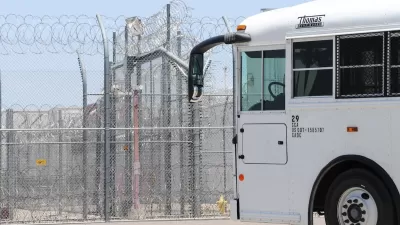A 2014 complaint about segregated housing lodged with the Department of Housing and Urban Development could revive integrationist housing policies to improve opportunities for all residents.

“Although Minneapolis remained over 90 percent white until the 1980s, civil rights activists scored serious victories in the mid-20th century. But as the city, and region, grew more diverse, desegregationist policies were increasingly stymied,” writes Jake Blumgart in Governing. Today, “The majority of the region’s subsidized housing is built in lower-income areas, while over a quarter of Black students go to deeply segregated schools — up from almost none 30 years ago.”
These conditions aren’t unique to Minneapolis. “Last year, a study out of the University of California, Berkeley, found that 81 percent of American metropolitan areas with populations over 200,000 were more segregated in 2019 than they had been in 1990.” Meanwhile, research shows that residents of resource-rich neighborhoods have better economic and health outcomes, making where you live a key determinant of social well-being.
Now, local activists are bringing attention to a 2014 complaint lodged with the Department of Housing and Urban Development (HUD) that could “reinvigorate more integrationist policies” if HUD threatens to withhold funds. “But, given how long the 2014 case has been left on the back burner, there are legitimate questions of whether this form of pressure will bring relief in a meaningful time frame,” warns Blumgart. Additionally, “The complaint about the Metropolitan Council wouldn’t address housing in Minneapolis and St. Paul (those cities already settled a separate complaint brought by [Michael Allen, a national civil rights lawyer]).”
However, “Prominent leaders in the region, like Minneapolis’ Jacob Frey, also express broad support of the goals of building more subsidized housing in more privileged neighborhoods and municipalities.”
FULL STORY: Can the Feds Force the Twin Cities to Tackle Segregated Housing?

Maui's Vacation Rental Debate Turns Ugly
Verbal attacks, misinformation campaigns and fistfights plague a high-stakes debate to convert thousands of vacation rentals into long-term housing.

Planetizen Federal Action Tracker
A weekly monitor of how Trump’s orders and actions are impacting planners and planning in America.

San Francisco Suspends Traffic Calming Amidst Record Deaths
Citing “a challenging fiscal landscape,” the city will cease the program on the heels of 42 traffic deaths, including 24 pedestrians.

Defunct Pittsburgh Power Plant to Become Residential Tower
A decommissioned steam heat plant will be redeveloped into almost 100 affordable housing units.

Trump Prompts Restructuring of Transportation Research Board in “Unprecedented Overreach”
The TRB has eliminated more than half of its committees including those focused on climate, equity, and cities.

Amtrak Rolls Out New Orleans to Alabama “Mardi Gras” Train
The new service will operate morning and evening departures between Mobile and New Orleans.
Urban Design for Planners 1: Software Tools
This six-course series explores essential urban design concepts using open source software and equips planners with the tools they need to participate fully in the urban design process.
Planning for Universal Design
Learn the tools for implementing Universal Design in planning regulations.
Heyer Gruel & Associates PA
JM Goldson LLC
Custer County Colorado
City of Camden Redevelopment Agency
City of Astoria
Transportation Research & Education Center (TREC) at Portland State University
Jefferson Parish Government
Camden Redevelopment Agency
City of Claremont





























